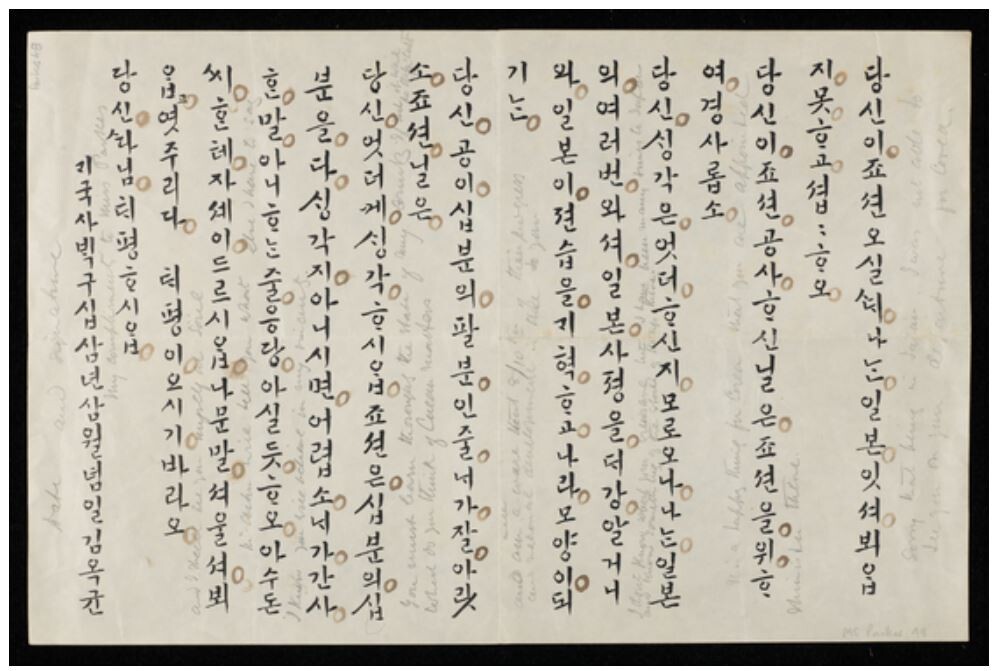A rare handwritten Korean letter by Kim Ok-kyun (1851–1894), a key figure behind the failed 1884 Gapsin Coup in Korea, has been uncovered at the University of Cambridge Library, shedding new light on his push for reform and early Korean diplomacy.
The letter, dated April 15, 1884, was addressed to prominent British diplomat Harry Parkes (1828–1885) and translated into English by William George Aston (1841–1911), the first British consul to the Joseon Dynasty. Written in Hangul, the document requests foreign support for sweeping reforms in Korea and was sent just eight months before the Gapsin Coup, a three-day uprising aimed at modernizing the country’s feudal structures.
“This is an extremely valuable document,” said Kim Jong-hak, professor of international relations at Seoul National University. “It demonstrates Kim Ok-kyun’s early diplomatic outreach and revolutionary intent.”
The letter was discovered in January by Jiyeon Wood, head of Korean and Japanese collections at Cambridge, while reviewing materials in the Harry Parkes Archive. According to Professor Kim Heung-soo of Hongik University, who examined the document, the handwriting matches that of Kim Ok-kyun, confirming its authenticity.
In the letter, Kim praises Parkes' role in Japan’s Meiji Restoration, writing that “eight-tenths of their progress and material development is due to you.” He urges Parkes to “learn thoroughly the state of my country,” a phrase experts interpret as a coded reference to plans for a fundamental political overhaul.
Though the term “coup” is not used explicitly, Professor Kim Jong-hak noted that Kim’s use of “please listen in detail to Mr. Asudon” (a transliteration of “Aston”) suggests he was covertly signaling reform plans to Parkes through Aston, who had just been appointed British consul in Korea.
Written in Korean, the letter was likely intended to shield its contents from Chinese and Japanese officials, reflecting Kim’s strong sense of national sovereignty. “Using Hangul was both a statement of independence and a practical measure to protect sensitive information,” said Professor Kim.
Kim Ok-kyun was in Japan at the time and learned that Parkes, then minister to China and concurrently minister to Joseon, would soon visit Korea to ratify the Treaty of Friendship and Commerce between the two nations. Parkes arrived in Seoul on May 1, 1884; Kim returned to Korea around the same time, and the two are believed to have met shortly thereafter.
The Gapsin Coup, which took place on December 4, 1884, was crushed within three days by Chinese troops. In the aftermath, reform and diplomacy became taboo topics in Korean society for over a decade. “Kim’s failure stalled Korea’s modernization and opening,” said Professor Kim.
Despite longstanding accusations of pro-Japanese leanings, scholars argue that Kim’s revolutionary goals were independent of any foreign allegiance. “He sought help wherever he could get it. Japan just happened to be the only nation willing to support him,” said Professor Kim. “It’s incorrect to say Japan’s government directed Kim’s actions.”
The newly discovered letter will be published later this month on the Cambridge Digital Library. Its preservation condition is excellent, and scholars expect it to contribute significantly to modern Korean diplomatic history.
“It breaks my heart,” added Professor Park, “that Kim placed even a sliver of hope in Parkes and Britain, only to be harshly criticized by Parkes after the failed coup.”
Sayart / Kelly.K pittou8181@gmail.com









